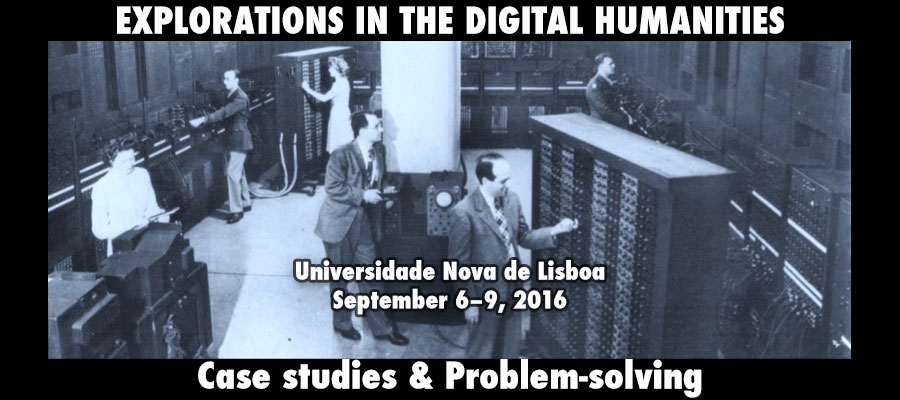Explorations in the Digital Humanities. Case studies & Problem-solving, Faculdade de Ciências Sociais e Humanas, Universidade Nova de Lisboa, September 6–9, 2016
The Digital Humanities have been largely discussed and are currently a well-established branch of knowledge with specific departments and journals. How does all this impact our on-going research projects? This workshop aims at providing concrete answers to specific needs and challenges emerging from projects carried out by master and PhD candidates and post-doctoral researchers.
A cluster of qualified international scholars and professionals has been put together to improve and transform our research, through theoretical analysis and technological resources. Seminars, as well as training sessions, will be organized in a collaborative and interdisciplinary environment to:
- (Re)center the Digital Humanities in questions raised by students, researchers, scholars and professionals.
- Facilitate the choice of techniques;
- Shape the outcomes through digital tools.
- Improve information sharing.
Workshops
Network Analysis - Martin Grandjean
Objects, people and ideas are increasingly intertwined in present societies and observing these networks is nowadays a powerful tool for interpretation and for new knowledge production in multiple disciplines. Similarly, when we look at the past we can study more or less complex social networks, or look at crossing data about people, ideas and events as a way to improve our knowledge of those societies. In recent years humanities and social sciences have made an increasingly extensive use of this type of methodological approach. Knowing the methods for construction, analysis and visualization of social networks, implementing them to specific research questions, will be the aim of this workshop.
Spatial visualisation of historical and archaeological data - Leif Isaksen
Geography is an essential variable in historical and archaeological interpretation and georeferenced data visualization can draw attention to patterns in the available information, lead to the development of new questions, or improve the communication of research results. Nowadays there are several techniques and tools used in spatial data visualization and its application to research in the Humanities. Social Sciences have spread to an ever wider field of analysis, chronologically and thematically. With this workshop the aim is to introduce concepts, methods and tools for spatial visualization and explore with concrete research questions the potential and the limitations of this type of approach.
Augmenting historical data - Richard Zijdeman
Current historical research often combines multiple data sources in order to answer a research question. In order to do so, raw data sources are first cleaned, shaped in a particular format and then combined. In various disciplines this work takes more time than the actual composition of the paper. Still, often the workflow performed is seldom shared and this work is often repeated making it inefficient. More importantly it hampers the reproducibility of research results. This session will show how Linked Data can tackle both problems. Highlighting tools from the datalegend project (http://datalegend.net/) to transform your data into linked and link your data to other datasets in an efficient and coherent way.
Reading and data mining maps - Evangelos Livieratos, Chrysoula Boutoura and Angeliki Tsorlini
Historical mapping is an important source of information for historical and / or archaeological studies. Old maps can help to improve our knowledge of places and people of the past. Its georeferencing, reading and subsequent data extraction may be performed using GIS or other tools, which then allow the use of new information layers for a wide range of research projects. With this workshop we will explore advanced digital methods for reading and extraction of historical maps data in order to look for these methodologies to meet specific research questions.
Each workshop will last for 6 hours. In the morning, the tutor of each module will conduct a presentation on the core issues (c. 1h30m). Then, registered participants are invited to briefly present (5 minutes) their projects / research interests, by identifying specific issues that they wish to be addressed and analyzed. The afternoon is intended for more in depth discussion of each project through the use of digital tools in a collaborative setting. The working language of the workshops is English.
Costs: One workshop: 15 €; Two workshops: 25 €; Three workshops: 40 €; All workshops: 50 €
Cost for workshops includes lunch in the canteen of FCSH for the days of the workshops selected, and attendance to the final conference. The promoters are doing efforts to facilitate the use of the NOVA University residence at students rates.
